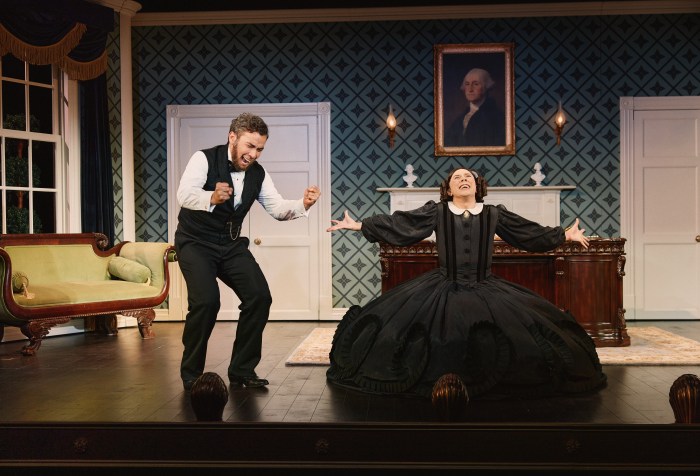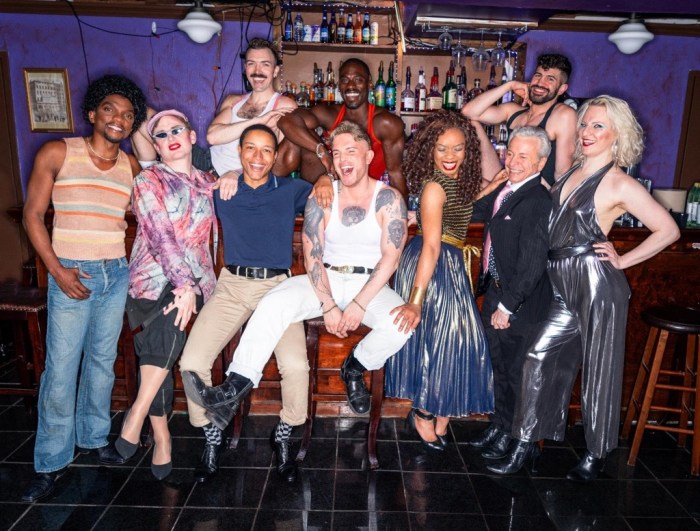A week in London began at the Royal Court Theatre with a cockfight — three cocks and a hen, actually –– in Michael Bartlett’s provocatively titled “Cock,” about the quandary of a gay man (the amazing Ben Whishaw) torn between a fading partnership with another man (Andrew Scott) and an unexpected liaison with a woman (Katherine Parkinson).
There is no cock in “Cock,” but it is quite erotic. There are no props or set, either –– just the actors, surrounded on all sides by the audience, passionately battling it out for 90 minutes. Whishaw is on stage almost constantly, working on but really trying to avoid the choice between his gay identity and a sexual relationship with someone as exotic as a woman.
Fights over love and art heat up winter in the West End
Thirty years ago, a play like this could have caused a riot in the gay community. The Whishaw character’s choice could be interpreted as anti-gay, but here illuminates the motivations behind many of our major life choices. Under James Macdonald’s direction and with this fine cast, it’s great theater. (“Cock” has closed, but maybe New York will be lucky to get it here the way we’re getting the Royal Court’s fine gay-themed “The Pride” at Manhattan’s MCC Theater in February, starring Whishaw and Hugh Dancy, who did not do it in London when I saw it last season.)
Even gayer than “Cock” is Alan Bennett’s smashing new “The Habit of Art,” directed by the just knighted Sir Nicholas Hytner, who brings the National Theatre to new heights with each season. This production at the Lyttleton, sold out through April 6 except for day seats (nationaltheatre.org.uk), surely merits transfer to the West End and Broadway as much as their collaboration on “The History Boys.”
In “Habit,” we’re in a National rehearsal space with actors, a playwright, and tech staff running through a new play about an imagined meeting of aging giants W.H. Auden (Richard Girffiths) and Benjamin Britten (Alex Jennings) at Oxford in 1972, ostensibly to talk about Britten doing the opera based on Thomas Mann’s “Death in Venice.” The play being rehearsed, which also features the men’s future biographer, Humphrey Carpenter (Adrian Scarborough), a stunning rent boy (Stephen Wight) for Auden, and a choir boy accompanying Britten, is mostly compelling despite some silliness thrown in.
It is as much fun watching the play being created before us –– especially with Frances de la Tour stage-managing both the play and the collected egos –– as it is seeing the drama unfolding between two artists in winter. It’s about the wonder, drudgery, and necessity of making art –– which Bennett and Hytner, who like Auden and Britten are gay, have done once again.
Equally compelling on the subject of creating art is John Logan’s new “Red,” which delivers 90 exhilarating minutes in the intimate Donmar Warehouse with Mark Rothko (Alfred Molina) and his young assistant, Ken (Eddie Redmayne), as the titanic artist works on commissions for the Four Seasons restaurant in New York’s Seagram’s Building in the 1950s. Logan co-wrote the screenplay for Ridley Scott’s “Gladiator” and here brings to vivid life the conflicts Rothko has with himself and with the art establishment, as well as Ken’s questions about what makes art.
Director Michael Grandage, the artistic director of the Donmar, does not just draw us into the making of the paintings but, with intensely focused performances, also into the larger issues of art’s place in life. “I’m here to stop your heart,” Rothko says, “not make pretty pictures.” (Through February 6; donmarwarehouse.com.)
The Tricycle Theatre is still mounting the best political theater in London, and that adjective is no pejorative. We need much more of what it fosters as the world heads off a cliff. I caught the last performance of “Category B,” the term for a tough prison. While more melodramatic than most offerings there, Roy Williams’ play makes us think hard about the plight of prisoners, mostly black men and their families, as well as the screws charged with managing them.
The most harrowing play of my week, however, was Tadeusz Slobodzianek’s “Our Class,” in a version by Ryan Craig at the National. It is as simply staged as “Our Town,” but we sure ain’t in Grover’s Corners, but in Jedwabne, Poland, where Catholic Poles perpetrated a literal holocaust by burning the half of the town (1,600 people) who were Jews in a barn in 1941. The story’s ten actors start out in a religiously integrated grade school class before anti-Semitism is allowed to surface, is quieted by a Soviet invasion in ’39, but turns murderous when the Germans take over. For decades, this horrendous crime was blamed on the Nazis rather than the locals.
Bijan Sheibani’s production is full of humanizing detail about both perpetrators and victims, all on stage and engaged in the drama –– even after they take their seats in death on the edges of the Cottesloe stage, surrounded by our uncomfortable eyes and rent hearts.
Each of these actors creates a memorable, unique individual by play’s end, moving us beyond the contemplation of a horrific incident to a deeper understanding of the cruelty, bravery, cowardice, and nobility of which we are all capable. (Through January 12; nationaltheatre.org.uk.)
An intense week of drama was relieved by several comedies, chiefly the Royal Shakespeare Company’s “Twelfth Night” at the Duke of York’s –– and even that starts out with a killer shipwreck. No less than four of the players were absent for the Boxing Day matinee, and Viola (Nancy Carroll) had to be replaced at the interval due to indisposition. It is a testament to the depth of the company in Gregory Doran’s hands that the show did not just go on but shined, particularly Alexandra Gilbreath’s funny Olivia and Richard Wilson’s dry Malvolio. (Through February 27; rsc.org.uk.)
Genial playwright Glenn Chandler was serving mince pies at the King’s Head Tavern on Christmas Eve along with his new “Scouts in Bondage” follow-up to the hilarious “Boys of the Empire” spoof of ’30s schoolboy life. Most of his merry men are back mixing double entendres and geopolitics as before. While not as sidesplitting as “Boys,” it’s a fun 90 minutes, especially with lubrication brought in from the bar. And his programs are worth the price of admission. (Through January 17; kingsheadtheatre.org)
I approached Mark Ravenhill’s adaptation of “Nation” at the National’s big Olivier with low expectations based on some notices, but found Melly Still’s inventive staging of the popular Terry Pratchett children’s novel compelling. Its mix of fantasy, adventure, and philosophy goes way beyond most of the kids’ fare served up in the West End and on Broadway. With an interracial and cross-cultural romance between islander Mau (impossibly buff Gary Garr) and shipwrecked English girl Daphne (Emily Taaffe) at its center , we’re a long way from “All God’s Chillun Got Wings,” and more’s the better. Gaye Brown is priceless in a “Keeping Up Appearances” turn as Daphne’s grandmamma. (Through March 28; nationaltheatre.org.uk)
Having finally seen “The Mousetrap” this spring after 56 years, I enjoyed its modern stepchild at the Royal Court in Michael Wynne’s “The Priory” –– friends called together at a converted monastery in the woods for a New Year’s Eve fraught with not just hooded figures lurking at the windows but also demons they bring with them. It is mostly light fare made more interesting by the complexity of the host, Jessica Hynes’ Kate. Hynes winningly played a similar role in Alan Ayckbourn’s “Norman Conquests” on Broadway last season.
“The Priory” has got sad gay stereotypes and even more sad straight ones, but manages to entertain and score some dramatic points about disaffected 30-somethings. (Through January 16; royalcourttheatre.com.)
Scoring no points on my scorecard was Ferdinand Bruckner’s 1923 “Pains of Youth” at the National’s Cottesloe, adapted by Martin Crimp and directed by Katie Mitchell, about disaffected medical students, male and female, in Vienna. The Guardian loved this “forensic analysis of a doomed, death-haunted generation.” But this play about alienation seemed aimed at alienating the audience, keeping the lights dim and the actors often turned away from us. It may be of academic interest and does have a lesbian subtheme, but it was a tough slog in an otherwise brilliant week at the National. (Through January 21; nationaltheatre.org.uk.)
Coming Up of Note in London:
Lanford Wilson’s “Serenading Louise” at the Donmar (February 11-March 27; donmarwarehouse.com);
Douglas Carter Beane’s “Little Dog Laughed” at the Garrick (January 6-April 10; garrick-theatre.co.uk);
Kim Cattrall and Matthew Macfadyen in “Private Lives” at the Vaudeville (February 24-May 1; vaudeville-theatre.co.uk);
David Suchet and Zoe Wannamaker in “All My Sons” at the Apollo (May 19-September 11; apollo.official-theatre.co.uk);
Jonathan Pryce in “The Caretaker” at the Trafalgar Studios (January 12-April 17; trafalgar-studios.co.uk);
Sam West in “Enron” at the Noel Coward (January 16-May 8;noel-coward-theatre.com);
Stoppard’s “Every Good Boy Deserves Favour” at the National’s Olivier (January 9-February 17; nationaltheatre.org.uk);
Felicity Kendall in “Mrs. Warren’s Profession” at the Comedy (March 16-June 19; thecomedytheatre.co.uk);
and Sir Ian McKellen and Roger Rees in “Waiting for Godot” at the Haymarket (January 21-April 3; trh.co.uk).
For complete information on upcoming London theater, visit londontheatre.co.uk.
Beyond the Theater:
There are several knockout exhibits at London’s museums, notably the Victoria and Albert’s sumptuous “Maharaja: The Splendour of India’s Royal Courts” through January 17 (vam.ac.uk), and “The Sacred Made Real” through January 24 at the National Gallery (nationalgallery.org.uk), which demonstrates how Spanish sculpture influenced 17th century Spanish painting and brought Christian figures to life in an effort to market Catholicism in the Reformation’s wake. There is also “Turner and the Masters” through January 31 at the Tate Britain (tate.org.uk), juxtaposing the early 19th century’s J.M.W. Turner with the old masters he strove to emulate and, sometimes successfully, surpass.


































